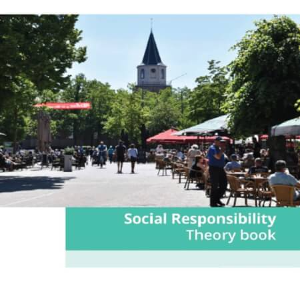Select one of our social responsibility modules.

Practice questions
In this module you can make the free SVH social responsibility practice questions. These questions are based on the summary social responsibility.

Summary SVH social responsibility
What does ‘sociale hygiëne’ (social responsibility) mean?
Hygiene comes from the word Hygieia, which means ‘goddess of purity and health’. Social responsibility in organizations means that the entrepreneur ensures a healthy environment for employees and customers. The word social means ‘society’ and these are the people around us.
These are the people around us.
Definition of social responsibility (sociale hygiëne)
Social responsibility means that people respect each other’s physical and mental health.
1.1 THE PURPOSE OF SOCIAL RESPONSIBILITY?
People’s conviviality and relaxation often go hand in hand with food and drink. Too much alcohol can cause long-term damage, including physical complaints and social problems. To prevent this from happening, the Dutch ‘Drank- en Horecawet’ (Licensing and Catering Act) exists. This law sets requirements for the knowledge of the manager in the field of social responsibility.
It is important for a manager to have knowledge about:
- The effects of alcohol on the body and mind (and combinations with drugs or medication).
- Alcohol abuse and addiction.
- The laws and regulations of alcohol.
- The gaming machines and gambling addiction.
Social responsibility is a mandatory aid for responsible alcohol dispensing (Mandatory for manager).
Values and standards
Social behaviour includes values and standards.
We learn values and standards for the environment in which we live (society) from an early age, including the environment at home, at school, at work or through social media. The environment is our frame of reference. Social behaviour is therefore also respecting each other on the basis of standards and values.
A value is what someone strives for. This can be for example: being honest, being sweet and caring, sharing materials or not smoking. In principle, each individual has, in principle, his own values and can shape and determine them himself.
A standard or decency standard is that what is defined in our culture. For example, no feet on the couch, getting up for the elderly in the tram, no jumping in the queue. The standards are ‘in principle’ self-evident for every Dutchman. Of course, there can be differences, such as one drinking from a glass and the other from a bottle. The values that exist are the standards. The standards are therefore concrete rules of conduct.

